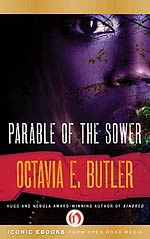
![]() Mattastrophic
Mattastrophic
1/17/2011
![]()
This book boasts well-crafted characters and a near-future dystopia that you cannot help but have a visceral reaction to. The book is written in the epistolary form as a series of journal entires by the main character, Lauren Olamina, who is a teenager growing up in a walled caul-de-sac community in California in the 2020's. Like many neighbohoods, there are those who get along with each other and those who don't, there are gossips, scandals, and other features of "normality." This neighborhood, however, has to pull together in mutual defense and support as the national infrastructure is collapsing, cities are crumbling, the countryside is filled with marauders, cannibals, and addicts of the drug "Pyro" that compels its users to set fires. Many people huddle in small communities, barely getting by and hoping for the prosperity and "normality" of the previous decades to come back while trying to fend off the barbarians knocking at their gates. Lauren is a "sharer," an empath who unwillingly shares the pain and pleasure of others due to a reaction of her birth-mother's drug abuse. She has to hide this since it can be a big liability in a world full of violent, mean-spirited monsters and opportunists. Her father is a minister, but Lauren has problems accepting her father's God and walks a path of discovery to her own belief system, Earthseed, that she feels can help drag people out of their denial of how bad things are and give them a purpose for the future. Of course, at some point Lauren is forced to flee her neighborhood and must take to the California roads.
The intersection of numerous ideas is one element of this novel that makes it so darn interesting: the country is devolving into gangs (of which the police are one), cannibalism, etc., and so the characters must carefully pick their way among the ruins of a once-prosperous USA. Big corporations are moving in to buy off what is left of the US and run their industries and corporate towns as slave labor camps in the manner of big corporations of the late 19th, early 20th century. Government is mostly a sham and the services we used to rely on and take for granted are long gone: the police might help you if you can afford their fees, or they might arrest you for whatever reason, steal your money, and sell you into slavery. Race and gender play important parts as well: as a young, black woman, Lauren is thrust into a world where women are routinely and savagely victimized and where open, if not violent racism is no longer tempered by the legal and social restrictions we know today.
Lauren's religous ideas are what differentiates this near-future, post-apocalyptic dystopias such as The Road. It offers a sense of hope for a better future that not only challenges us to think about the role of religion in society, but makes the book readable as it helps to mediate the various tragedies and heartbreaks throughout the book. Octavia Butler is acknowledged as an SF writer with strong mainstream popularity, and The Parable of hte Sower is a prime example of why. Reccomended for anyone with the exception of children and certain young-adults (due to the graphic nature of certain scenes--although I would note that Butler uses violence for a purpose and doesn't glorify in it).
http://www.strangetelemetry.wordpress.com